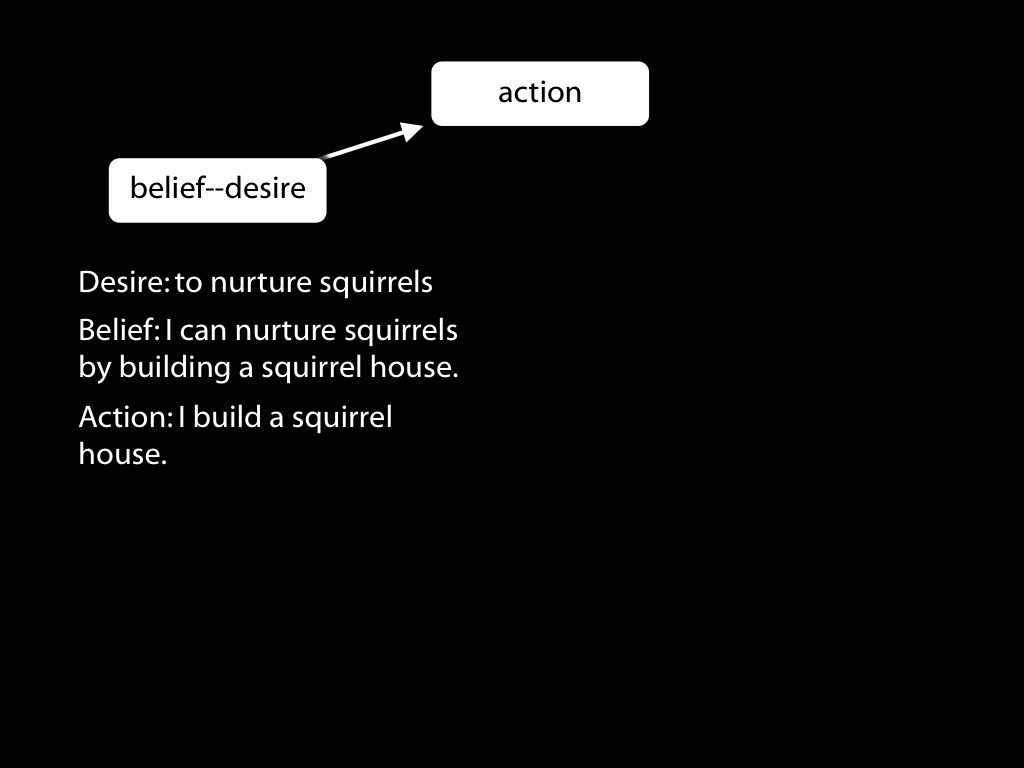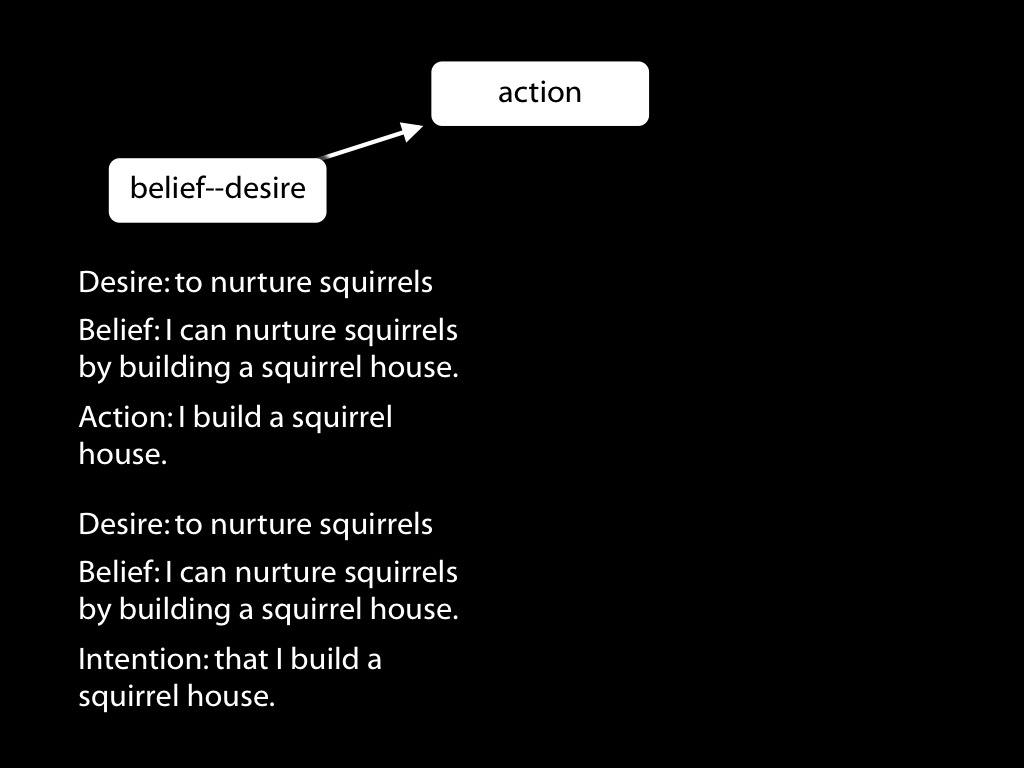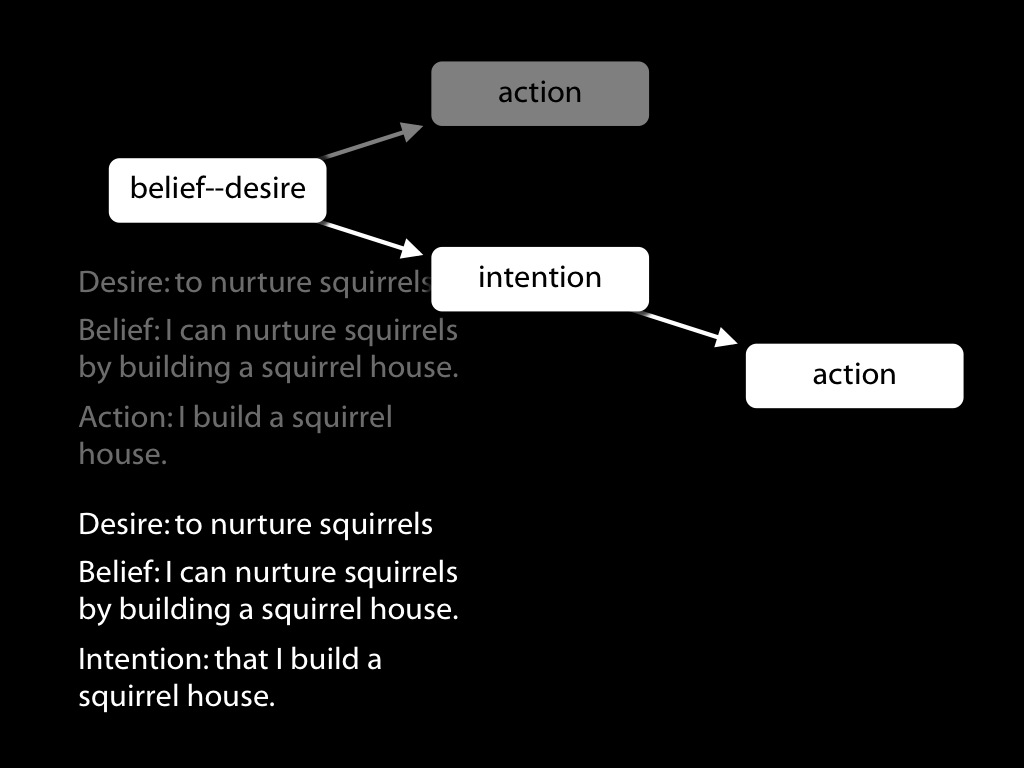Click here and press the right key for the next slide.
(This may not work on mobile or ipad. You can try using chrome or firefox, but even that may fail. Sorry.)
also ...
Press the left key to go backwards (or swipe right)
Press n to toggle whether notes are shown (or add '?notes' to the url before the #)
Press m or double tap to slide thumbnails (menu)
Press ? at any time to show the keyboard shortcuts
Question Session 03

this is being recorded
Jasmine(?) q.1 (asked last week)
Why do we need intentions at all? Why not just beliefs and desires?



Jasmine q.2
Could intention just be an illusion?
To satisfy our need to be in control of our lives?
Couldn't all our actions be habitual?

What if we devalue the food?
Habitual process : it will have no effect on lever pressing
‘Goal-directed’ process : it will reduce lever pressing (to none)
‘the laboratory rat fits the teleological [goal-directed] model’
Dickinson, 1985 p. 72
Jasmine q.2
Could intention just be an illusion?
To satisfy our need to be in control of our lives?
Couldn't all our actions be habitual?
Tiago : background
What distinguishes your actions from things that merely happen to you? (‘The Problem of Action’)
Standard Solution: actions are those events which stand in an appropriate causal relation to an intention.
Alternative Solution: actions are those events which stand in an appropriate causal relation to a motor representation.
Objection 1
habitual processes
Some actions run counter to any of the agent’s intentions because they are dominated by habitual processes.
Objection 2
motor processes
Invoking motor representations yields a solution to the problem of action that is no worse than the Standard Solution.
Tiago
Does the Alternative Solution evade the objection from habitual processes that threatens the standard solution?
What distinguishes your actions from things that merely happen to you? (‘The Problem of Action’)
Standard Solution: actions are those events which stand in an appropriate causal relation to an intention.
Alternative Solution: actions are those events which stand in an appropriate causal relation to a motor representation.
Objection 1
habitual processes
Some actions run counter to any of the agent’s intentions because they are dominated by habitual processes.
Objection 2
motor processes
Invoking motor representations yields a solution to the problem of action that is no worse than the Standard Solution.
cinema setting (stimulus) -- eat popcorn (action)
intention: skip popcorn tonight
(Neal et al., 2011)
aside : what about basic actions and intentions ?
Tiago
Does the Alternative Solution evade the objection from habitual processes that threatens the standard solution?
Or, in other words, does the alternative solution have any problem accommodating the influence of habitual processes (as the standard solution does)?
If not, does this not make the Alternative Solution a better response to the problem of action?
What distinguishes your actions from things that merely happen to you? (‘The Problem of Action’)
Standard Solution: actions are those events which stand in an appropriate causal relation to an intention.
Alternative Solution: actions are those events which stand in an appropriate causal relation to a motor representation.
Objection 3
???
Alex (github:xandir) : background - mechanistically neutral
1. What distinguishes instrumental actions from things which merely happen to an agent (and from noninstrumental actions, if there are any)?
(‘The Problem of Action’; Frankfurt, 1978; Davidson, 1971)
2. Which states cause instrumental actions?
Standard Solution - mechanistically committed
Alternative Solution :actions are those events which stand in an appropriate causal relation to a motor representation.
Xandir
Are motor representations mechanistically neutral? Or at least less mechanistically dependant compared to intentions
Alex (github:xandir) : background - mechanistically neutral
1. What distinguishes instrumental actions from things which merely happen to an agent (and from noninstrumental actions, if there are any)?
(‘The Problem of Action’; Frankfurt, 1978; Davidson, 1971)
2. Which states cause instrumental actions?
Standard Solution - mechanistically committed
- mechanistically neutral
Alternative Solution : actions are those events which stand in an appropriate causal relation to a motor representation.
Simple Theory
Actions are those events which happen in order to bring outcomes about.
Alex (github:Xandir)
Are motor representations mechanistically neutral? Or at least less mechanistically dependant compared to intentions
What effect does [the ‘Alternative Solution’] have on our understanding of agents?
Would it be possible to misattribute agency to beings we do not consider to be agents?
Compare: ‘an advanced robot capable of replicating my behaviour to a high enough degree might be mistaken for me’
Is that a problem for mechanistically committed accounts?
Jan - background
Anscombian position
- An intentional action is one that can be explained in terms of reason
- We are aware of it, without any observations
Jan - background
Anscombian position
‘when S is doing A intentionally, S knows that she is doing A.
What is more, acting for a reason, in a sense that contrasts with mere purposive behavior (of the sort characteristic of other animals), essentially involves such knowledge: in acting for a reason, I know an explanation of what I am doing that cites that reason, and therefore know that I am doing it.
That is why, for Anscombe, the question ‘Why?’ is ‘given application’ by the agent. Intentional action turns on knowing the answer to that question.’
(Setiya, 2014)
Jan
Building on Kalis & Ometto (2021), would it not make sense [...] that [...] motor representations are clearly linked to intentions and that [actions guided by motor representations] are merely expresions of them?
Actions guided by ‘motor representations are naturally [...] explained in terms of reason -’
I am reaching for an egg with intention to break it differently, than if I was to merely move it and so on.
We are also aware of them without observations, however this awareness might not be very explicit.
So [1] they do stand in a certain relationship with intention, and therefore [2] the Alternative Solution can be rendered as a Standard one with an extra step.
Tiago
Does the alternative solution evade the objection from habitual processes that threatens the standard solution?
Or, in other words, does the alternative solution have any problem accommodating the influence of habitual processes (as the standard solution does)?
If not, does this not make the alternative solution a better response to the problem of action?
Alternative Solution: actions are those events which stand in an appropriate causal relation to a motor representation.
Tiago:
It avoids Objection 1 (habitual processes)
Jan(?):
It’s compatible with an Anscombian View
Alex(?):
But it’s mechanistically committed, so not genuinely Anscombian.
T+J+J+A:
if we want to take discoveries in the behavioural sciences seriously,
we might want to
reject not only the Standard Solution
but also the Causal Theory more generally
and instead to
consider a broadly
Anscombian position.
more questions?
